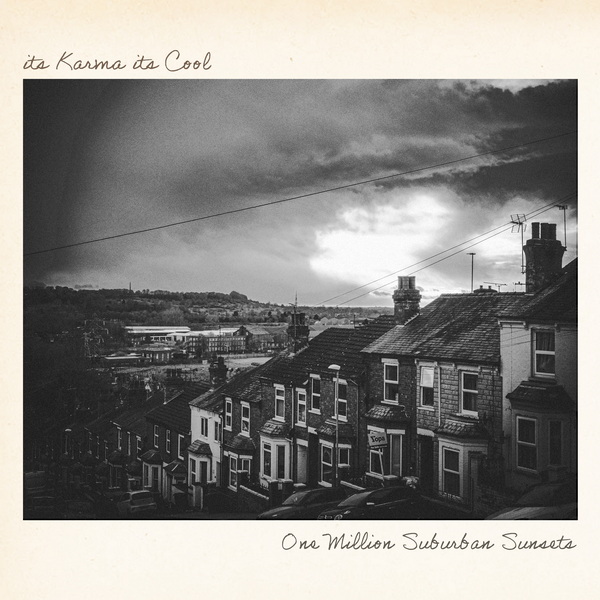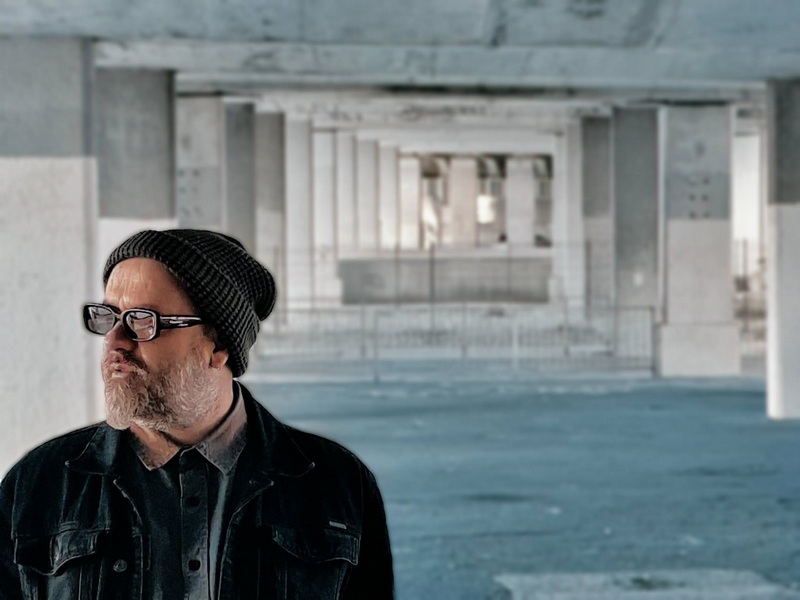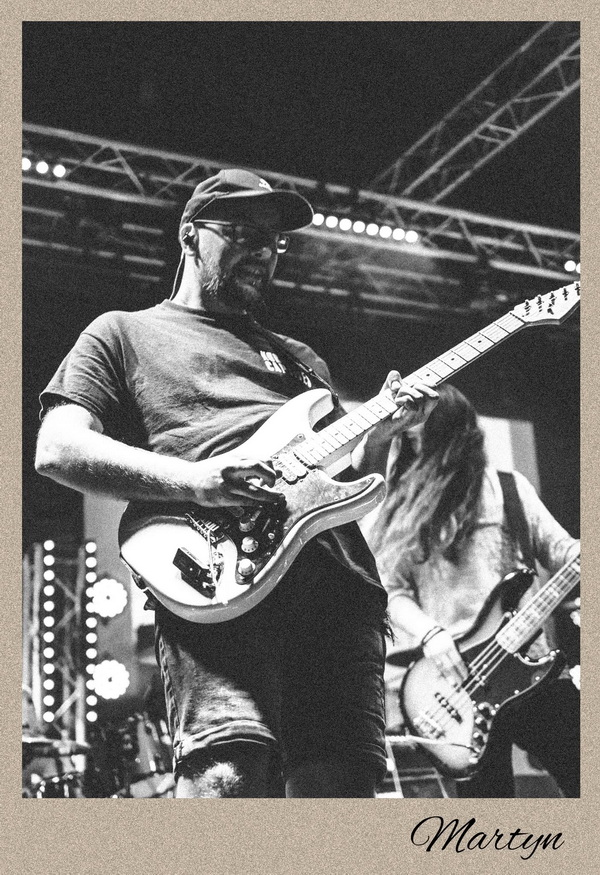
1). I normally refrain from asking artists to provide too much detail regarding the “meaning” of your songs, because I think that cuts into the listeners’ ability to personalize their experience. The more they can find their own meaning, the more they’re going to connect with what is being said. What the title track said to me is that each of us, among the vastness of the Universe, are alone, and yet still a part of the tapestry. How close is that to the overall intention of “One Million Suburban Sunsets?”
(Jim) That’s pretty much it, Mike. We arrive alone, we’re going to leave alone. It’s what we do between those two points that counts. This album, more than anything we’ve released, is about real life and real people. It’s about what it means to be alive in the 21st Century. We all see the same sun up in the sky, but there is a different story to tell for everyone living under it. Ultimately, we really need each other, we need a sense of family and belonging. We all need to remember we’re only here for a very short time, blink and we’re gone. We’re not a band that preaches, though, and I don’t get involved in politics, I always leave the lyrics open to interpretation. It’s always more important what the listener believes the songs to be about, than what I had in mind. They can be whatever you think they’re about. There are no wrongs and no rights.

2). There’s a propulsive intensity, a sense of urgency, in many of the songs on the album. It’s not volume for the sense of volume, it’s not “metal,” but a song like “21st Century Meds” opens with some very delicate, ringing harmonics, and then it just roars. “You carry the spirit, we are the city” seems to reinforce the title track’s framing of individuals as a part of a greater whole. To what degree would you say this specific set of tracks are thematically connected, as opposed to being stand-alone efforts?
(Jim) We made a conscious decision this time round to make ‘One Million Suburban Sunsets’ our big ‘guitar’ album, our rock record. We felt it was time to comment on what we see every time we put on the TV, or read the headlines. As writers, you can only ignore that for so long. Although it’s not a concept album, there are themes that run through the songs, it’s our reaction to the world we find ourselves living in. “21st Century Meds” is a punk-rock anthem for this modern world; everyone is addicted to something, everyone’s looking for something, everyone needs something. We made ‘One Million Suburban Sunsets’ to be played from beginning to end in one go, the tracks run into each other and take you on a kind of journey, but equally, the songs can stand on their own. People don’t seem to have the time to listen to a full album anymore.
3). Where and when you deploy “guitar solos” is, I feel, a very unique and intriguing phenomenon. In a song like “Arcades,” the lead guitar fills are woven throughout, but there is an actual solo mid-song. Some artists do the verse / chorus / verse / solo thing, but in your band, it’s never a “step up, step back” proposition, more of a constant ebb and flow. How much of the finished product reflects a collaborative effort, versus individual players suggesting enhancements and embellishments?
(Martyn) That’s a great question, and one with a very simple answer for us. We don’t write a song with anything particular in mind, even the first EP where we set out to do a power-pop record ended up with an Irish folk style song on it. For us, as soon as we get that first idea, that first riff or chord progression, the song just starts unraveling itself, and if that means a multi section lead guitar break appears out of nowhere, then it appears. Especially in the early days, I’d tend to write those kind of sections with more traditional guitar solos, because of my love for David Gilmour and more blues based rock music, but Jim would always say to me ‘keep it simple, use the melody, make it a hook’ and that advise has stuck since. These days, I can sit down to write some demos or get some ideas to jam with the guys, and I know what will work for this band and what won’t, and when me and Jim get our heads together to refine these demos and jams, the process is very quick and easy these days because we both know what works as a Karma song and what doesn’t. The TLDR answer is – we throw ideas at the wall and see what sticks, and considering that after this album we’ll have released 54 songs under the name It’s Karma It’s Cool within 5/6 years of being a band (60 including Solitary Bee), then we must be doing something right, some of them stick.

4). How much of a challenge is it to perform these songs live? There’s a wealth of detail in every track, but are some songs destined to be studio creations, and others made for the concert stage? A track like “Weightless” lives up to the title, with delicate, floating guitar passages, but I imagine what makes the song distinctive might also be difficult to execute in a live setting.
(Martyn) We certainly write certain songs with the intention of being live bangers, and certain songs to be studio tracks. Weightless for example, was originally the intro section for These Heavy Days, but when it came to placing it on the album, we decided it was a perfect place for a mid album interlude, so decided to extend it and make it its own track. Similarly on the Homesick album, we decided that a ‘theme song’ was needed to open and close the album, and I borrowed from a classical music trait of using certain themes and motifs throughout different songs. That’s really important to me, to make an album feel like an album, and there comes the difference between album and live tracks. If we were to play These Heavy Days live, chances are I’d look for a different live track to place it directly after, and make a similar transition like what happens with Weightless on the album, and whilst we could play Weightless live and place some of the synth stuff onto a backing track, would it be a valuable use of 2/3 minutes live? Would our audience appreciate that slight down tempo break from our song songs? As I said in the previous question, we’ve got over 50 songs to choose from now, its quite stressful to condense down to a 45 minute set, and when we’ve already got so many fun songs that translate to a live setting so well.
5). “We are born to carry the weight of these heavy days…” This song once again emphasizes prevailing against less-than-ideal circumstances…”We swim against the fear…” In the overall chronology of the album, when was “These Heavy Days” conceived? Was it intentional to tap into a central theme, or did it just organically unfold and fit in with what you had written up to that point?
(Jim) Again, it’s about a needing to belong, a ‘we’re all in this together’ kind of thing. We’re born into this world, we inherit it for a very short while, as our fathers did before us, then we’re gone. It’s left to whoever comes next to pick up the pieces, and make the best they can. I can’t remember for sure, but I think it was one of the first songs written for the album, we had a number of writing sessions, and the tracks came together pretty quickly, we were all on the same page from the start. Martyn, Mikey and Adam have played their hearts out on this record, everyone’s pushed themselves out of their comfort zones.
6). I’ve admired your band’s “voice”…your overall message…since “Wooden Buddha.” It was clear that you had something more substantial to address in your songs than simple pop concerns. Given that, how would you describe your audience? Who are the people who have most enthusiastically embraced what you do, and how you do it?
(Jim) It’s not something we really think about, to be honest. Everyone is welcome. You can overthink things, and lose that initial spark. We only ever write for ourselves, if we think what we do is worthy of being heard, then hopefully someone else will. We’ve never followed trends, or music fashions, we just do what we do. I’d like to think if you approach our music with an open mind (and ears) you’ll find something there. There’ll always be the melodic side to us, and the big choruses, it’s just sometimes we need to turn the amps up loud and scream. Our followers are called the Karma Army, and are always very vocal at our shows, it’s what it’s all about, that connection with people, regardless of who you are, where you come from, how old you are. That’s what good rock and roll is all about. And we’ve never been a band to repeat ourselves, we like to push ourselves as songwriters to keep it interesting, not just for ourselves, but for our followers. We could easily write another ‘Woke Up In Hollywood’ again, but there would be no point. We have to keep raising the bar.
7). “I saw Goliath fall, we all screw up, it never really mattered…” That’s a bold pronouncement…and another unique expression of this band’s “voice.” How did that thought come to you?
(Jim) You can so easily become caught up in the past and mistakes you’ve made, that you stop living in the ‘ here and now’. There’s nothing you can do to change what’s gone, but you can work on making today a better day than yesterday. Stop beating yourself up. If we can learn lessons from our past mistakes, and not repeat them, then those mistakes “never really mattered” in the big scheme of things anyway. Life is meant to be a learning process, nobody is perfect. We hold our breath and start again. We all have our own Goliaths in life to overcome, physically, or mentally. The song’s saying, have faith and belief in yourself, you’ll be surprised what you can achieve. Learn from the past and move on.
8). In “Explosions,” you sing “Here’s to the times we held each other up…” That seems to be the big, overall message of the album, right?
(Jim) Yes. In the end, we are all we have.